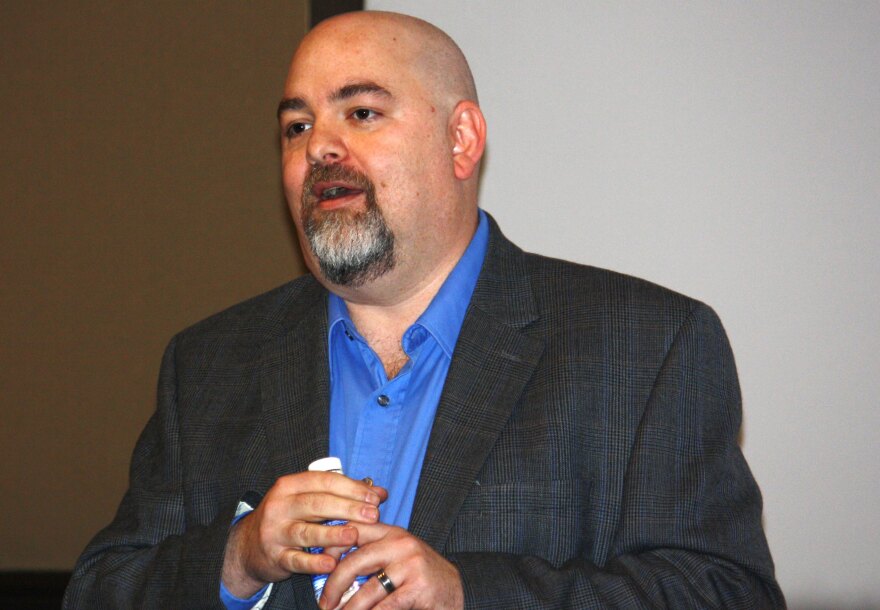A conference this weekend -- the first conference ever hosted by the student skeptics organization at MU -- brought in well-known atheist speakers from around the country.
The conference, SashaCon, had been in-the-works since summer. It all started when MU SASHA (Skeptics, Atheists, Secular Humanists and Agnostics) heard the story of Faisal Saeed Al-Mutar, an up-and-coming atheist speaker who first came to the U.S. as a refugee from Iraq.
After hearing his story, they decided to invite him to come speak at MU. Members of MU SASHA began spouting out other speakers they had heard and wanted to speak at the university, as well. Chantelle Moghadam, who does public relations for the group, suggested they host their very own conference.
“It can be hard for students, especially in the Midwest, to be open about their atheism, and we want to provide them a community,” Moghadam said.
The Kansas City Atheist Coalition and the Secular Student Alliance at the University of Central Missouri helped with the planning process.
The SASHA CON logo. Image courtesy MU SASHA.
Speakers at the conference, which was held at MU on March 15 and 16, included national figures in atheism such as human rights activist Maryam Namazie and well-known blogger Greta Christina, along with some local speakers.
Moghadam said each speaker was pushed to talk about a topic they don’t usually present on at conferences.
“To keep a movement alive and to keep us progressing, we need to introduce new things,” Moghadam said. That means including topics such as human rights, “rather than just religion.”
Here's a look inside a few of the conference sessions:
Dillahunty: It's OK to say "I don't know"
Matt Dillahunty was a southern Baptist for 25 years and on his way to becoming a pastor, when he decided to take a different path.
Now, Dillahunty is the host of "The Atheist Experience" and travels to participate in religious debates, siding with atheists.
During SashaCon, he told a story of one formal debate that lasted an entire weekend in San Antonio with the Church of Christ.
Dillahunty said when he came across a problem or argument he didn’t have an answer to, he simply replied, “I don’t know.” He said this was a scary concept to many of the people there.
“They hear ‘I don’t know,’ and they say ‘I do know,’” Dillahunty said.
One pastor later asked Dillahunty if he was comfortable going to his grave saying, “I don’t know.”
Dillahunty answered, “No,” and that is why he continues to explore.
Another point often made by others during the debates he participates in is that science is always changing, and is therefore unreliable. He said that science “doesn’t make a proclamation about truth,” and that if you think it’s wrong, then simply prove it wrong.
By the end of the weekend of the Church of Christ debate, the church said there was no winner or loser to this debate. But Dillahunty said he began receiving emails with more and more questions.
At SASHA Con, he emphasized that when debating with people, it is better to disagree with the other side’s beliefs – not to tell people they are stupid.
Mehta: Make sure you check your facts

Hemant Mehta, most known for his work online as "The Friendly Atheist," talked about the importance of fact-checking things before you post them or re-post them online. The facts and proof from primary sources are usually more interesting than what was posted originally, he said.
He gave the example of questioning a fire safety policy at Pensacola Christian College.
He had read online that before leaving a burning building, the girls had to be in “proper” attire. So he sent the school an email.
They responded, “Yes, we ask the girls if they can to grab knee length shorts or a skirt to quickly change in to.”
Mehta wrote back and asked for clarification – why wasn’t the priority just to get out of the burning building?
The college responded by saying that yes, the priority would be to get out as quickly as possible – but since the closets are by the doors, it would be possible to be modest on the way out, and even a robe would be fine.
This exchange of emails, Mehta said, was actually more interesting than what he originally saw on the Internet – and it provided proof of what was actually going on.
He told his audience that fact-checking and following-up should be a daily part of everyone’s lives.
This story was produced in partnership with Columbia Faith & Values (ColumbiaFAVS.com), mid-Missouri's source for religion news.




